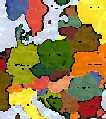 |
Vol 1, No 7, 9 August 1999
|
|
|
 T H E I S S U E (#7):
T H E I S S U E (#7):
A Queer Taboo Andrew Stroehlein Homosexuality is gradually becoming a phenomenon which the Western world accepts as a natural part of human existence. In Central and Eastern Europe, as this week's articles on the subject make clear, this is hardly the case. Granted, in the bad old days, it was worse; Communist regimes bludgeoned most things which did not conform to strict party doctrine, and though the situation did vary from country to country within the region, gays were clearly not part of the officially permitted ideal anywhere. Gay life and gay culture were forced underground - much like other aspects of unofficial life. But in the intervening decade since the collapse of Communism in Central and Eastern Europe, while other aspects of underground culture and politics have emerged loudly - even triumphantly - homosexuality is still very much a taboo, something hidden from public view and only joked about nervously if mentioned at all. There is something odd about this. Everything else imaginable emerged boldly after 1989: political parties, heavy metal, environmentalism, radical right racism, long hair on men, conspicuous consumption, kareoke, snowboarding - you name it, it is now all out in the open. But try to find two guys holding hands in pubic in central Prague, and you will be looking for a very long time, indeed. This is not easily explained. In the case of the more devout countries in the region, Poland for example, traditional religious beliefs would seem to be exerting their influence, but such reasoning would not explain homophobia and intolerance in a country such as the Czech Republic, which is about as atheist a country as one can imagine in Europe. Czech society is hardly Victorian in its approach to sex, yet the subject of homosexuality and homosexuals' rights are rarely discussed openly. Even deeper than religious beliefs in the countries of this region is a strong cultural conservatism. These societies were not allowed to develop naturally, promote public debate and differentiate in the manner seen in Western Europe and America over the last 50 years. While the West was discussing difference over those decades, the Communist societies were generally subjected to one ideal, one model of appropriate living. Everything else was deviation and not acceptable. Some say that these societies were kept in a social deep-freeze for four decades and are only now going through the cultural changes that the Western world went through in the 1950s. According to this view, which presumes a belief in "stages" of social and cultural evolution, the great social revolutions seen in the West in the 1960s are still waiting to be unleashed. Actually, the situation is somewhat more serious than that. Social change was not put on hold from the 1940s to the 1990s; socially conservative values were actively unified across each country and relentlessly re-enforced in each individual. The nuclear, 2.4 family was the only lifestyle that did not draw suspicion from the authorities, and thus, even if it were not so officially sponsored with both slogans and financial incentives as it was, the traditional family was the retreat of almost everyone who was frustrated with other aspects of his or her life. Work was a joke at best, travel was limited, shopping was a drudgery and local clubs and organisations were untrustworthy, so the only outlet for individual expression and a sense of freedom was the traditional family unit. Only within that unit could a person feel safe, say what was on his or her mind and forge any kind of decent human relationships. Everything outside that unit - whether an individual or an institution - was suspicious and had to be treated with caution, and, although it may well be ten years since the end of those regimes, economic troubles have kept Central and East European families very tight. Thus, it is hardly surprising that a phenomenon which can appear to reject that traditional unit of trust is viewed negatively in these societies. In Central and Eastern Europe, homosexuality is not seen as the natural part of humanity that it is but as something threatening to the only basis for human relationships that people truly hold dear. Perhaps only after trust has spread out from the family and into society in general will tolerance of homosexuality become the norm in this region. Andrew Stroehlein, Editor-in-Chief, 9 August 1999 Links on this topic: A reasonable place to start on the cultural front is the East European Gay Culture page.
|
|
![]()
Copyright (c) 1999 - Central Europe Review and Internet servis, a.s.
All Rights Reserved